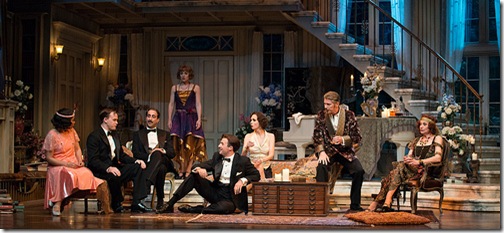Stratford Misfires with Noel Coward’s Hay Fever: reviewed by Jamie Portman.
Photo. Cylla Von Tiedemann
STRATFORD — You find yourself worrying about the Stratford Festival’s bungled revival of Noel Coward’s Hay Fever even before the performance begins.
‘That’s because a glance at the printed program notes reveals that director Alisa Palmer, a Shaw Festival veteran who really ought to know better, has decided to impose some kind of trendy feminist agenda on Coward’s 1925 comedy. Hence, among other things, Hay Fever actually deals with a mother-daughter power struggle: Coward’s memorable creation, veteran actress Judith Bliss, is suffering a mid-life identity crisis, while daughter Sorel is merely doing what a young woman must do, which is to break free of her family and become independent.
Or so Palmer claims.
This misconceived notion of what the play is really about — an acutely observed account of the comic chaos that results when members of the eccentric Bliss family invite an assortment of guests for the weekend and then treat them abominably — leads you to expect the worst. And by and large Palmer’s production, sagging under an excess of stylization, delivers on these fears.
The defects are on view immediately with our introduction to the Bliss offspring, Simon and Sorel. As portrayed by Tyrone Savage and Ruby Joy, they’re not quite human; such is the effect of mannered posturing and the odd assumption that instead of engaging in dialogue, they’re supposed to make self-satisfied pronouncements to the audience.
Their archness is so mind-numbing that can you can only hope that things will improve when that most dependable of Stratford actresses, Lucy Peacock, emerges from the garden and gives us our first glimpse of their mother — the infuriating but irresistible family matriarch, Judith Bliss.
Unfortunately, the improvement is negligible. For one thing, Judith’s arrival is staged in such a mundane manner that you scarcely notice she’s in the room. And for another, Peacock already seems to be pulling back and refusing to savour the full potential of one of Coward’s most splendidly realized female characters. This is an oddly low-octane Judith and another example of the disconnects that keep the production stumbling.
And speaking of stumbling, designer Douglas Paraschuk’s massive staircase — a major culprit in making the Bliss family’s Great Hall looks more like a stage set than anything else — includes one wonky step on which various characters keep tripping. Palmer milks this recurring sight gag for all it’s worth, to diminishing returns. Meanwhile she and her cast keep disregarding the the script’s classic comic moments — the ones that should be winning laughs, but don’t.
The evening becomes a series of misfires, lacking momentum and character definition, and repeatedly blunting Coward’s barbed social observation. And nobody on stage really seems comfortable. Kevin Bundy manages to make Judith Bliss’s playwright husband too much the amiable nonentity. And among the hapless guests we have a misused Cynthia Dale in the role of an elegant socialite. Costume designer Dana Osborne has ensured that Dale is stunningly gowned, but the actress herself is allowed no more personality than a clothes rack.
The adroit physical comedy of the angular Sanjay Talwar, in the role of a dignified but increasingly incredulous diplomat, comes as a relief; furthermore, unlike most colleagues, Talwar actually seems to relate to the sensibility of the play. And there’s no denying that Sarah Orenstein, a slovenly delight as a grumbling maid, is a welcome diversion whenever she shows up on stage. But that doesn’t mean she’s really in synch with anything else that’s happening.
(Hay Fever continues to Oct. 11. Ticket information at 1800 567 1600 or stratfordfestival.ca)
